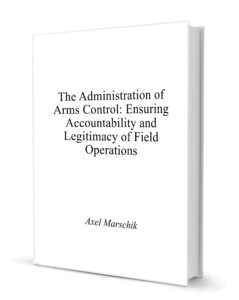
Axel Marschik
Read PDFRead PDFInternational arms control operations are based on a foundation of global programs and instruments. An analysis of these operations gives an indication of the many challenges they face in practice and what administrative means have been developed to address them. Special attention is devoted to the secondary norms of accountability and to the relationship between the internal legal system of the field operation, often conceived as a largely autonomous self-contained regime, and the legal system of its higher authority and general international law. Finally, the increasingly relevant participatory role of civil society in arms control and its conformity with basic principles of international administrative law will also be examined.

